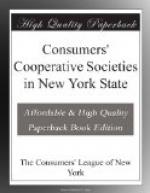Then the causes of the continued failure were one by one eliminated. A business manager who had an intense interest in cooperation was hired to supervise general operations. He took over much of the work of the volunteers and for the first time the laundry developed a well thought out policy. The inexperienced bookkeeper was eliminated and all supervision headed up in the new manager. Better service brought more work, and new machinery made greater output possible without additional labor. The manager found labor cost too high and introduced methods which saved both labor and money. He found the machinery badly arranged. When the plumber told him it would cost twenty-five dollars to rearrange it he spent a dollar and forty cents and did it himself. After a discussion in the Board of Directors which nearly wrecked the organization, a Board policy of leaving all details of management to the manager and chairman of a managing committee was determined upon, while the Board devoted itself to the determination of general policies.
The results of these changes were soon apparent. For the first time the dead line between losses and earnings was crossed and net earnings gradually began to mount. In September, 1921, the amount of business wavered around a hundred dollars a week. In March, 1922, it averaged about $330 per week, and net earnings have run as high as $75 per week.
The laundry is still small and is located in quarters for which it pays a regular commercial rent. It has expanded several times and now has three power washers, an ironer or mangle, a dry room and other equipment. It employs a business manager, who supervises the plant and does everything from keeping the books to collecting the laundry in a pinch, a work manager, a washer, a sorter and marker, four ironers and a delivery boy. It still holds hard to the policy of putting out the very best kind of work and economizing in every particular.
Its very success has in a way embarrassed the laundry. The manager has been offered special inducements to leave. The delivery system has been tampered with. There has even been acid thrown on the clothes by outsiders jealous of its business. But this has only stimulated the whole membership to fight harder to realize their aim of getting their own laundry work done the way they want it, and without profit.
* * * * *
The Finnish Cooperative Societies of Brooklyn.
What is it that makes the Finns so successful at Cooperation? Industry and cleanliness. At any rate those are the striking characteristics of the Finns of Brooklyn.
Up to the present time they have never paid any dividends. It has been explained to them, as their manager says, that if the business is to serve them properly it must grow, and in order to grow it needs all the surplus earnings for expansion. And so, because the members are industrious and far-sighted, they have foregone their dividends. The cleanliness of their stores, too, is an inspiration not only to their membership but to hundreds of others who have visited their plant. This is one of the biggest business assets they possess.




